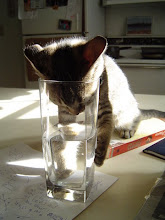The Internet has wrought great changes to how we perceive our world. There is a theory that we get and evaluate information based upon 'trusted sources'. That is we allow others to a certain extent to evaluate the credibility of the information we are presented. We give very little credibility to the drunk bum ranting about aliens in the sewers because we know that street people are often crazy, drunks are almost always wrong and we don't know the guy. So the sewer aliens are safe from our scrutiny.
On the other hand when our sainted, gray haired mother tells us that sister and her husband want to sell their condominium, we think that likely to be true. We trust our mother, it's exactly the sort of thing they would do, Mom's up on all the family news and she's a special confidant of our sister.
Television has used and abused our credibility filters for quite a long time. Commercials often dress actors up as doctors because we trust doctors. Actors who can sound especially sincere get hired for voice over work in commercials or as news anchors. Walter Cronkite in particular made his career on looking and sounding authoritative.
There is a more modern trend in credibility. Or rather in the mass destruction of it. Dan Rather assumed that he would have instant and overwhelming credibility because he was the CBS news anchor. What he ignored was the massive loss of trust for television news that had occurred throughout his tenure as anchor (and mostly not due to his actions). Talk radio and the Internet opened up new sources of information and the audience for television news shrank.
Rush Limbaugh enjoys a very large audience, but little credibility. I don't listen to talk radio, but I have friends who do enjoy listening to Rush even while they rarely agree with what he says. Likewise, I know an inordinate number of conservatives who listen to NPR.
On the internet, I visit both Kos, DU, HotAir, and Free Republic. I have Fox and CNN both bookmarked, as well as Youtube. I rarely grant instant credibility to anything I find on those sites.
There may be those who grant certain sources universal and unconditional credibility. But I suspect that the percentage of those who do is rather small and confined to the very young, the very old and the overly credulous.
Mostly what we grant is 'conditional credibility'. If there is a plane crash, I trust CNN to get the hard facts correct. That is, where the crash occurred, what make of plane, who the air carrier was and how many were injured. I do not trust them to report a U.S. Supreme Court decision accurately. I trust Eugene Volokh to construe constitutional law decisions. I do not trust him on kitchenware. Tony Bourdain is my kitchen guru, but I ignore what he says about religion. And so it goes.
Which brings me back to the doctor in the lab coat. Like it or not, we Americans are now a skeptical people. We are confronted on a daily basis with people who wear the symbols of knowledge or authority and we regularly dismiss what they tell us. The old ways of evaluating authority are dying or dead. Where this becomes important in religion is as follows.
I recently overheard a woman wearing a clerical collar bemoan that she was not given any respect as a pastor. As I understand it, she felt that she had the symbols of authority, but strangers upon meeting her accorded her no additional respect because of her station. She and her friend attributed it to the fact that she's a woman. I disagree. That may have been true twenty or so years ago, but in today's world we see a lot of people accoutered in symbols that no longer have meaning.
To an atheist or agnostic, a person in a clerical collar is a religious and to be treated as such. In other words, as a fraud or charlatan, or at best as a well-meaning fool. To a 'person of faith' the collar means that the wearer is also a person of faith, but not necessarily of the same faith. Which makes a bit of difference in a diversely religious country such as the United States.
Even assuming that we encounter an Episcopal priest, that doesn't mean that we grant the priest any additional authority or trust. Maybe in some earlier time, a new pastor was granted immediate credibility, but I doubt that is the case any more. Today, the clergy as well as everyone else must earn trust.
Thursday, November 29, 2007
Subscribe to:
Post Comments (Atom)



No comments:
Post a Comment